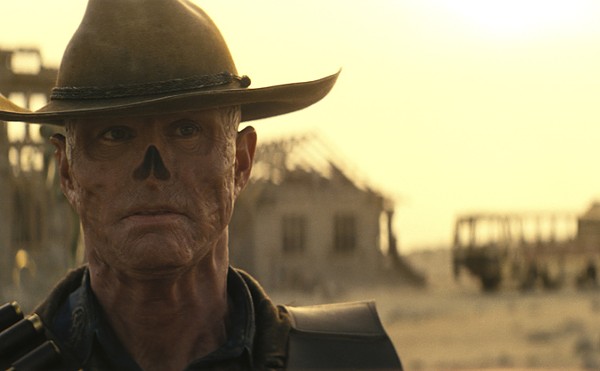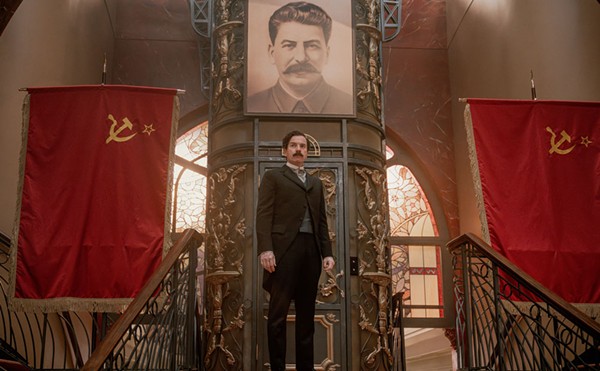See movie review.
David Friedman, aka Silly Billy, is New York's -- and possibly the country's -- most famous children's birthday party clown. Silly Billy has often been featured in fluffy articles, but there are things about his family's past that are not fluffy at all. In the mid 1980s, the Friedmans of Great Neck, Long Island, were caught up in a sex scandal of epic proportions. The case was widely publicized at the time, but a new documentary, "Capturing the Friedmans," offers a more intimate portrait of this tragic clan -- a Franny and Zooey-esque collection of neurotic but gentle eccentrics, at once brilliant and doomed.
Silly Billy belongs to the category of not very nice clowns who scold and screech at children at their birthday parties. Still, he stops short of being mean or scary. In fact, Silly Billy is such a schlemiel that he makes tiny children feel superior -- and perhaps even a little sadistic. He does the same magic trick over and over, wrong every time, until the 4-year-olds are shrieking with contempt; then he does it right, all the while cracking jokes that only the parents get. Everybody loves him. David's younger brother Seth was a well-known advocate of underground publishing during the 1990s, putting out the exhaustive media-watchdog zine review "Fact Sheet Five."
And there was the late paterfamilias, Arnold Friedman. A Coney Island-raised Caspar Milquetoast with shapeless clothes and major myopia, he was nonetheless a vortex for the energies of other people, most of them young. During the '40s and '50s, he was a talented Latin-music pianist and mambo bandleader who played venues like Roseland. After he married and had three boys, he became a teacher in Queens. At Bayside High School, he was known for his radio-TV-film course. Former students would speechify at class reunions about how Mr. Friedman turned their lives around -- weaned them from teen-age anomie, pointed them to careers in media.
Arnold instilled in his sons a propensity to document their lives. The boys always had Super 8s in hand, recording birthdays, seders and vacations. Arnold helped them do funny little dramas like Dr. Zero and the Destruction Ray, made by 10-year-old David, in which an evil scientist makes people disappear by beaming a flashlight at them. A pioneer of computer-lesson materials, some of which he co-published with Steve Allen, Arnold also taught popular after-school classes at the family home in Great Neck. He won countless teaching awards. His sons adored him.
But Arnold had a secret life that the police eventually pounced on and used to destroy the family. That is the subject of Andrew Jarecki's award-winning "Capturing the Friedmans." For New York's most famous clown, the release of the documentary is both cathartic and terrifying.
The other Arnold
Arnold Friedman was a pedophile. According to forensic psychiatric reports developed as his case unfolded, he harbored sexual urges for boys ages eight and upward. He managed to keep these proclivities secret until late 1987, when police raided the Friedman home based on evidence obtained in a three-year-long postal sting operation. In 1984, Arnold had ordered a kiddie-porn magazine from the Netherlands that the feds intercepted at JFK. A postal inspector then pretended to be a fellow pedophile, writing letter after letter cajoling Arnold to put something in the mail.
After he finally did and the house was searched, the feds told Nassau County police that Arnold was giving computer lessons at home. Worried that he was photographing and molesting his grade-school students, detectives seized class rosters and started interviewing. Within weeks, several little boys were accusing Arnold of priming them for sex by showing them dirty computer games, then raping and terrorizing them for months, even years. Jesse Friedman, the youngest of Arnold's three sons and his classroom assistant, was also implicated. Both were arrested on charges of child molestation.
"Capturing the Friedmans" shows the family members convulsed by their discovery of Arnold's pedophilia and their powerlessness before the rage of the cops and community -- even as they at first staunchly proclaim Arnold's and Jesse's innocence.
Because I knew the family and have written extensively about cultural hysteria over child sex abuse in schools, I appear in the film as a talking head and was hired to consult on it. I also told director Jarecki about the family's home movies, some of which he ended up using in his documentary. Amazingly, the Friedmans' shock, shame, internecine warfare and indignation -- like their childhood skits and cheerful family holidays -- are captured on videotape, which David recorded for many months, up to and including his father's and brother's convictions.
Phone calls from prison
I first heard from Jesse and Arnold in 1989, shortly after they were sent to prison. Back then, I got a lot of mail from inmates claiming they'd been falsely convicted. The Friedmans wanted me to look into their case, but I demurred. I was put off by Arnold, who told me in a quavering, stop-start voice over a prison pay phone: "You have to remember, those magazines used to be perfectly legal. I was trying so hard to control my urges. To not touch a child. My therapist told me to go to Times Square and buy porn. To sublimate with. He called it a prescription." And there was also the matter of Arnold's and Jesse's confessions -- Jesse had even repeated his on "Geraldo."
Then, in 1990, I came across a paper that had been recently presented at the San Diego Children's Hospital's annual national conference on child abuse. The author was David Pelcovitz, chief of child and adolescent psychology at Long Island's North Shore University Hospital, and the paper ("Group Therapy and Hypnosis for Victims of Child Pornography and Extrafamilial Sexual Abuse") concerned his therapy with kids in the Friedman case. Many of them, Pelcovitz noted, had no recollection of abuse, so he plied them with details about the Friedmans' purported crimes. The paper implies that he used hypnosis to jog their "memories." By then, studies by researchers like Nicholas Spanos and Elizabeth Loftus were emerging that cast doubt on the reality of repressed memory, as well as suggesting that hypnosis can create false recollections, even for abuse. Among criminologists, concern about false confessions was growing. I contacted David and told him that I took his family's claims of innocence seriously.
Meanwhile, David's career as Silly Billy was taking off. He appeared on Letterman, and Susan Orlean wrote a piece on him in The New Yorker without knowing about the Great Neck scandal. I never wrote about him until now because he begged me not to. He lived in constant fear that his celebrity clients -- like Susan Sarandon and Eddie Murphy -- would never again let him near their kids if they discovered the connection.
David and I used to have lunch when I visited Manhattan. David would do sleight-of-hand tricks as he reminisced about his days as an 11-year-old visiting 42nd Street and enraging the three-card monte players by beating them at their own game. Once, about seven years ago, he mentioned that he'd made videos of the family for months after Arnold's and Jesse's cases broke. Back at his apartment, he dug the tapes out of a closet and played them. There was his mother, Elaine, raging at Arnold; David, Seth and Jesse raging at Elaine; Elaine alternately cursing her husband and tenderly embracing him; Arnold suffering anxiety attacks that include high-pitched animal sounds; the whole bunch desperately weighing the advantages of trading false confessions for shorter prison time. It was 25 unnerving hours of a family cracking under pressure and their own disgrace about the magazines. I asked David why he made the videos. "Maybe because we knew we'd never be a family again," he said.
I think they're about the real Dr. Zero -- Arnold Friedman -- being annihilated, with his entire family, by the Destruction Ray.
The reality of pedophilia
Medical libraries and the Internet are filled with research on pedophiles, but most people get their information from USA Today or CNN, with their breathless Megan's Law scenarios: kids raped, beheaded, dumped in the woods. The investigations in the Friedman case started with magazines and from there, authorities accused Arnold and Jesse Friedman of raping boys, battering them, and threatening them with further assault, even death, if they told.
The Long Island authorities might have been more sober in their investigation if they'd better understood the psychology of pedophilia. According to Kay Jackson and Rashmi Skadegaard, New York City psychotherapists with 20 years' experience treating convicted child molesters, extreme violence among pedophiles is exceedingly rare. An undetermined proportion never touch children at all. (It's impossible to know how many, since the subject is so hush-hush.) But in several studies -- including two published by University of Southern California child-abuse researcher John Briere and colleagues in 1989 and 1996, and one in 1995 led by psychologist Gordon Hall, currently at the University of Oregon -- male college students were asked if they ever felt sexually attracted to small children. At least a fifth of the men answered yes.
In addition, Hall hooked his subjects to a plethysmograph (to detect organ engorgement) -- when exposed to images and audiotapes of prepubescents in sexual situations many of them had erections. While most of these "normal" men never act out their fantasies, they might look at pictures. Paul Federoff, a Canadian researcher and clinician at Canada's Royal Ottawa Hospital, noted recently that the fastest growing group in his therapy sessions are men who, as far as Federoff knows, have never abused a child, but were arrested for looking at child pornography on the Web.
According to government-published monographs written in the 1980s by FBI sex-crimes expert Kenneth Lanning, pedophiles seldom use overt threats and violence. It's far more common, say Jackson and Skadegaard, for pedophiles to seduce through their gentleness and sensitivity, and for their abuse to take the form of undressing, fondling and oral sex.
If victims fail to report the crimes, it's often because they're ashamed that they enjoyed the abuser's attentions, or worried he'll go to jail. While molestation can of course leave kids with grievous psychic wounds, research by Philip Ney of the University of British Columbia and his colleagues (published in 1994 in the journal Child Abuse and Neglect) suggests that physical and verbal abuse and neglect tend to be far more emotionally damaging to children than molestation. Research by Bruce Rind and colleagues, published by the American Psychological Association in 1998, indicates that many children seem wholly unaffected by sexual contact with adults. This should not surprise. The Arnold Friedmans of the world are kinder to kids than many normal adults.
What, exactly, did Mr. Friedman do? In an interview for "Capturing the Friedmans" that did not make it into the film, a former computer student who insists the accusations were bogus nonetheless recalled that Arnold used to give boys furtive pats on their clothed legs and butts. It felt kind of weird, he said, but the kids shrugged it off as mere nuisance behavior by the nebbish who was still a great teacher. But -- as the movie makes clear -- Arnold sometimes did more than patting. During the investigation, he told a therapist and his family that almost two decades before, he'd committed sex acts with two neighbor boys. He never gave details except to say they "stopped short of sodomy" -- and the victims have not come forward.
With this confession of ancient misbehavior, if the case against Arnold had stopped at the magazine possession charge, he probably would have gotten a year's probation and therapy with people like Kay Jackson and Rashmi Skadegaard. Based on their experience, they tell me, some 80 percent of sex offenders in treatment can remain out of prison and pose no danger to the community. Jackson notes that, contrary to common wisdom, sex offenders repeat their crimes at lower rates than other offenders. But Arnold confessed to the mass molestation charges apparently because he was so filled with shame and despair. Jesse followed suit -- after acquiescing to what he now insists was his lawyer's strategy, claiming Arnold abused him as well -- because he thought no jury would believe the son of a confessed pedophile was innocent.
That's the only conclusion I could come to as I delved into the case. There was the total lack of physical evidence that one would expect after violent rape: semen, blood, anal scarring. The pornographic computer games found on some class computers, which police said were loaded by Arnold, were in fact being traded by kids all over Long Island in the late 1980s. Further, Arnold for years gave private piano lessons to grade-school boys. Yet even when the community was rocked with news of the Friedmans' sexual perfidy, not one piano student came forward. Police got hold of Arnold's computer-class rosters, but the piano students' names were never written down -- which might explain why none of them "remembered" abuse.
Besides official accounts of hypnosis-related therapy sessions with alleged victims, there is a transcript of an interview with one boy, which surfaced while "Capturing the Friedmans" was being researched (but also wasn't included in the film). The boy insists that nothing happened in the computer classes, but detectives warn that if he doesn't disclose, he'll grow up "gay." Several of the interviewees also accused three teen-age boys whom the Friedmans barely knew. The case had clearly been developed as a gay "sex ring" -- a police fantasy rampant during the homophobic Reagan years, when Anita Bryant was denouncing gay men as child molesters and psychiatric nurse Ann Burgess, author of 1988's "Children Traumatized in Sex Rings," was publishing her first writings on the topic. Child-protection authorities speculated about gay men organizing to move boys around the country in order to molest them and make pornography. The sex-ring theory was the precursor of the "satanic" day-care cases, such as the McMartin preschool in California and Kelly Michaels in New Jersey.
Only a bit of this detail made it into "Capturing the Friedmans." In Jarecki's defense, he was trying to fit a very complex case, along with all that powerful family video, into under two hours. But Jarecki, the multimillionaire founder of Moviefone, also has shrewd business sense. While the film was in production, he told the Friedman family he thought the two were innocent of the charges. Polling viewers at Sundance in January, he was struck by how they were split over Arnold and Jesse's guilt. Since then, he's crafted a marketing strategy based on ambiguity, and during interviews, he has studiously avoided taking a stand. Teaser ads pitch the film as a Long Island Rashomon: "Who do you believe?" For Jarecki and his PR people, the question is rhetorical.
The Friedmans have had little active part in this strategy, or for that matter in making the film. When David mentioned to me three years ago that some guy was doing a documentary about his clowning, provisionally titled "Funny and Silly," I was amazed that he would take such a chance on his family tragedy being revealed. But David was aglow about the movie advancing his career.
Some months later, Jarecki put two and two together and changed the focus of his film. David was distraught, but he and the family had already signed releases for "Funny and Silly." After he called me for help, I spoke with Jarecki, who struck me as sincerely interested in doing an in-depth examination of the case. I'm happy now that the film is out. Market-tested Rashomon or not, I think it gives the Friedmans -- and the culture -- a little bit of space to think about who pedophiles really are, what they really do, and how we should deal with them as human beings instead of monsters.
Epilogue
Two Decembers ago, while the movie was in production, Jesse was released on parole. He had gone to prison at age 19, long-legged and shiny-haired. He came out 13 years later thick from bad food, balding from incipient middle age, and gap-toothed from jailhouse attacks at Attica and other state facilities. He was dizzied by grocery stores and shocked by cell phones. He still lionized his father.
For years, he and David had been telling me what a great person Arnold was. Well yes, there were the magazines. David once told me, when they were young, each of the brothers had run into them while poking in Arnold's things. David said it was no big deal, because Arnold was, in all other respects, such a good man. As the case snowballed and the brothers struggled to save the family, they increasingly saw their father as a martyr -- a view that fossilized when Arnold died in his jail cell in 1995, an apparent suicide.
Martyrology has remained especially important for David as he struggles to protect his career. During filming, it was intensified by Jarecki's focus on the possibility that the Friedman sons -- Jesse in particular -- were molested by Arnold and might not remember. Jesse says he has no memory of being abused, and neither do the other brothers. This could well mean that they weren't victimized. On the other hand, lack of recall is common in adults who were molested when young. According to the new book "Remembering Trauma," by Harvard psychologist Richard McNally, which debunks the "traumatic amnesia" theories that have been bruited by some child-protection workers, children may forget molestation simply because they were too young when it happened or because the abuse didn't feel weird enough to remember for very long.
Jarecki's repeated questions about whether Arnold molested his sons unnerved David and Jesse, and heightened their fears about the movie. Jesse's first on-camera interview was so guarded that it had to be shot again. The first year of production was replete with screaming matches and phalanxes of lawyers. Things calmed down considerably when Jarecki started finding former computer students who now say police coerced them into accusing Arnold and Jesse.
Still, David now worries that his clients will think he was an abused child, and that they will fold that belief into the folklore that countless therapists spread -- that molested kids become molester adults. Writing in "Pedophilia: Biosocial Dimensions," Arizona prison psychotherapist Randall Garland reports finding no convincing evidence that victims become sex offenders. But who has read "Pedophilia: Biosocial Dimensions?" David reasons that in order to continue his clown career, he must convince the world that he is uninfected by the urge to molest -- which, to him, means denying his father ever molested.
The family hopes that "Capturing the Friedmans" will vindicate Arnold and Jesse. Whether or not it will, the film makes it timely to ask: What is the human reality of pedophilia? When acted on, what does it typically do to minors? How should we respond to it? And what do we do about people like Silly Billy's terrible and wonderful dad?















